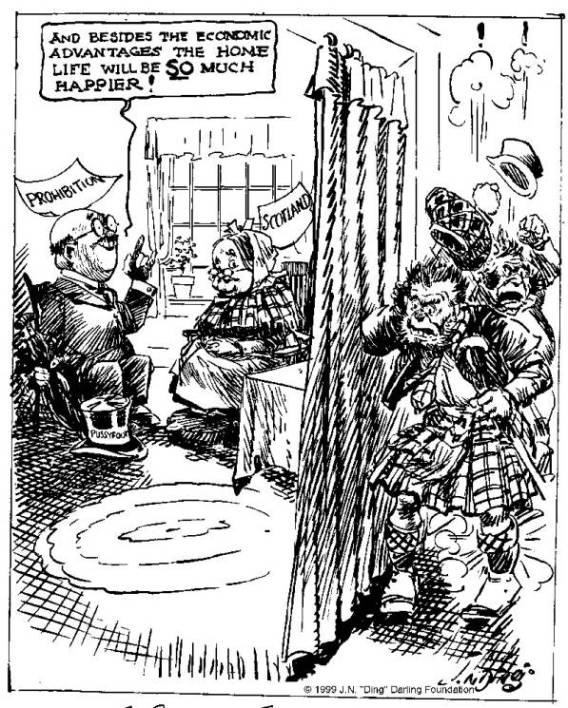Joyce A. Walker
Political cartoons have, since the mid-19th century, been an integral part of most of our daily newspapers. They pass comment on the affairs of the day, often (but not necessarily) in humorous vein, and can poke fun at those whom Robert Burns termed ‘the unco guid’ who had, perhaps, grown too big for their boots! One can also learn a great deal about the attitudes and mores of a society by the cartoons they produced.
Cartoonists depend, to an extent, on stereotypes to enable them to get their message across easily and comprehensibly. Such necessity has led to the adoption and development of such national icons as John Bull and Uncle Sam, representing Great Britain and the USA respectively. How they are used depends, of course, on the viewpoint of the cartoonist – whether approving or disapproving of the actions of Britain or the USA. When I was compiling a collection of cartoons from the 1920s for my own research, I found several that referred directly to Scotland, and it’s interesting to see how long-lived stereotypes (no matter how erroneous) can be!
This cartoon comes from the Des Moines Register (Iowa) and was drawn in 1920 by Jay Norwood Darling, universally known as “Ding”, perhaps the doyen of American political cartoonists working at that time. With missionary zeal, many Americans were moved to go overseas to preach the “benefits” of prohibition to those poor unfortunates who still drank hard liquor. “Mrs Scotland,” in her plaid shawl, seems prepared to give him a hearing, especially when the ‘economic benefits’ are being pointed out to her (and, of course, as everyone knows, all Scots are mean, penny-pinching people!!). The reaction of her husband and his crony behind the curtain is self-explanatory. Darling seems to have been moved to draw the Scotsmen with ape-like faces, in the manner of Sir John Tenniel’s 19th century Irish ape-man, suggesting how little he (Darling) really knew of both races.
The Scotsmen are, of course, wearing the kilt and carrying a knobbly walking-stick – a stereotypical image based partly on the image created by Sir Harry Lauder, the Legendary Laird of the Music Hall, who was very popular in the USA at that time. The two men are horrified by the prospect of Prohibition being introduced in Scotland (all Scots are whisky swilling drunkards, as everyone knows!!). The economic advantages and happy home-life portrayed by the advocate of Prohibition do not seem to hold much attraction for the two men. The Prohibition advocate, whose hat is labelled ‘Pussyfoot’, a term meaning to creep around furtively, appears not to have heard the two men enter the house, but “Mrs Scotland” has, and is awaiting developments!!
Prohibition had been enforced in Britain during the First World War, as a means of ensuring efficient wartime production, but it was never seriously intended to continue it beyond the end of the war. That the USA introduced Prohibition at all was just as much of a surprise to the rest of the world as such a move would be today, and of course, it only lasted until 1933, when it was rescinded. The unforeseen consequences, such as the illicit alcohol trade (both in rum-running from abroad and in the establishment of Speakeasies – illegal drinking dens), the rise of criminal gangs led by men like Al Capone, the political corruption necessary to allow all of this criminal activity, meant that what was, on paper, a very fine, altruistic ideal, would never stand the test against human nature!
Of course, none of the evil side effects of Prohibition were known when this cartoon was drawn in 1920, but one wonders if Mr. Darling had a suspicion as to how it might go, and used the Scots in his drawing as a warning to his own countrymen!
____________________________________

